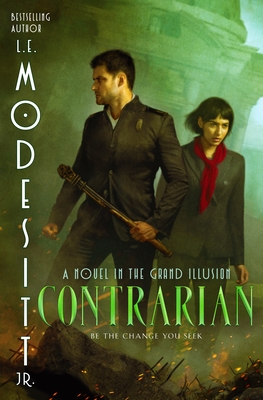 Contrarian (The Grand Illusion #3) by L.E. Modesitt Jr.
Contrarian (The Grand Illusion #3) by L.E. Modesitt Jr. Format: eARC
Source: supplied by publisher via Edelweiss
Formats available: hardcover, ebook, audiobook
Genres: fantasy, gaslamp, steampunk
Series: Grand Illusion #3
Pages: 624
Published by Tor Books on August 15, 2023
Purchasing Info: Author's Website, Publisher's Website, Amazon, Barnes & Noble, Kobo, Bookshop.org
Goodreads
L. E. Modesitt, Jr., bestselling author of Saga of Recluce and the Imager Portfolio, continues his gaslamp political fantasy series which began with Isolate and Councilor . Welcome to the Grand Illusion
In Contrarian , protests against unemployment and poor harvests have become armed riots as the people sink deeper into poverty. They look to a government struggling to emerge from corruption and conspiracy.
Recently elected to the Council of Sixty-Six, Steffan Dekkard is the first Councilor who is an Isolate, a man invulnerable to the emotional manipulations and emotional surveillance of empaths―but not the recent bombing of the Council Office Building by insurrectionists.
His patron, the Premier of the Council, has been assassinated, leaving Dekkard with little first-hand political experience and few political allies.
Not only must Dekkard handle political infighting, and continued assassination attempts, but it appears that someone high up in the government and corporations has supplied arms and explosives to insurrectionists.
Insurrectionists who have succeeded in taking over a naval cruiser that no one can seem to find.
My Review:
If diplomacy is war conducted through other means, then it can be argued that politics must be civil war conducted by other means. There’s certainly a civil war going on between the three political parties in Guldor, complete with campaigns, strategies and entirely too many casualties.
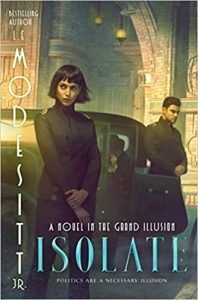 The first book in this series, Isolate, ended in triumph. The second, Councilor, ended in tragedy. This third book, Contrarian, ends in – well, you’ll see – or at least you’ll see enough to make you want to pick it up. I hope.
The first book in this series, Isolate, ended in triumph. The second, Councilor, ended in tragedy. This third book, Contrarian, ends in – well, you’ll see – or at least you’ll see enough to make you want to pick it up. I hope.
The overall theme of The Grand Illusion series (Isolate, Councilor and now Contrarian) is wrapped around the grand and all-too-often grandiose illusion that government can somehow take care of all of the people all of the time even as it caters to the elites at the top of the dogpile.
While spinning pretty much everything they can – or can invent – to convince people that the folks who are sincerely trying to fix things are actually the people causing it because they are the ones bringing attention to the injustices.
We all know it works because we’ve seen it in action, much too often and much too recently, in real life.
However, by setting this intense political discourse in a gaslamp fantasy world and embodying it in the literal body of one political neophyte who is doing his damndest to make real life better for average people, we get to see the arguments from the outside and can pretend, if necessary for our psyches, that the story doesn’t have relevance to the real world.
The first book ended in triumph, as the middle-class, working-class Craft Party was swept into power in the constitutional monarchy of Guldor because they had a charismatic leader at the head of the party, his security aides were exceptionally good at keeping the man alive in spite of the number of assassination attempts he faced, AND the competing parties, Landor (nobility) and Commerce (megacorporations) had screwed the pooch so thoroughly and so often that their abuses of power became too obvious to cover up.
The second begins in the triumph of starting to stab at the myriad problems afflicting the country, only for that triumph to be cut tragically short when that charismatic and effective Craft leader was assassinated along with many of his most able councilors.
All except one, who was one of those exceptionally good security aides turned councilor in his own right. In Contrarian, Steffan Dekkard is caught on the horns of multiple dilemmas and in the midst of overwhelming changes both personal and professional.
Dekkard is the ‘contrarian’ of the title. He is one of THE most junior councilors in the Council of Sixty-Six, both in age and political experience. He is also the clear ‘spiritual’ heir to the assassinated Axel Obreduur, but can’t take up the reins of power – at least not yet. This is the story of him finding a way to operate, not so much from the shadows but from the back benches, managing up the levels of his party while continuing to dodge the political machinations of his enemies – along with the increasing number of assassins they aim at his head.
The opposition Commerce party is like a hydra, sprouting two heads for every one of their plots he manages to thwart. It is part of the cut and thrust of politics even at the best of times, but he knows he can and will lose some of the battles in pursuit of the greater war.
An assassin only has to succeed once. If Dekkard, with the assistance of his friends, working under the eagle eye and mind of his security aide and new bride Avraal, has to practice ‘Constant Vigilance’ while still serving his office, taking care of his constituents, and somehow managing to have a life – for as long he can.
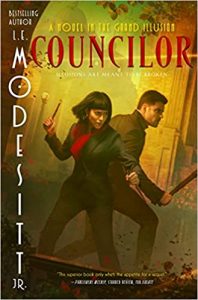 Escape Rating A+: This series is my catnip. I could read about Steffan’s work day, his colleagues, his attempts to maneuver around a great many of them, and the crises in his country that he tries to prevent, pretty much all day long. As I did for the two days it took me to finish the book a few months ago for Library Journal, AND the day it took me to skim-read just now for this review. .
Escape Rating A+: This series is my catnip. I could read about Steffan’s work day, his colleagues, his attempts to maneuver around a great many of them, and the crises in his country that he tries to prevent, pretty much all day long. As I did for the two days it took me to finish the book a few months ago for Library Journal, AND the day it took me to skim-read just now for this review. .
The book – and the previous books in the series – combine a kind of ‘slice of life’ story with an ongoing exploration of how the sausage of politics is made and why most people really don’t want to know about exactly what goes into it.
What makes it work, or at least work fantastically for this reader, is the way that all of the political maneuvering, whether for good or for evil, is embodied in the characters. Which means that this isn’t traditional epic fantasy, even though it is certainly epic in scope.
But we are meant to like Steffan Dekkard and his wife Avraal Ysella-Dekkard, and we do. We believe they’re working for, not an abstract good, not a ‘greater good’ but to make the lives of as many people as they can better by getting their government to work for all its citizens and not merely a privileged few who grease the wheels.
They are fighting the good fight, and it’s fun to watch them do their work – surprisingly so as watching them work often involves just watching them go through their day. It shouldn’t be riveting but it is and I was every step of the way.
 The progress of the series so far reminds me a lot of the author’s Imager Portfolio, although not so much the first three books as the rest of the series that started (honestly re-started) with Scholar. Which means I’m expecting the Grand Illusion series to encompass Steffan Dekkard’s political career and end with a book titled Premier – or at least with Steffan holding that title in the book.
The progress of the series so far reminds me a lot of the author’s Imager Portfolio, although not so much the first three books as the rest of the series that started (honestly re-started) with Scholar. Which means I’m expecting the Grand Illusion series to encompass Steffan Dekkard’s political career and end with a book titled Premier – or at least with Steffan holding that title in the book.
Whether or not my surmise about the far-off ending of the series is correct, Contrarian ends in a way that absolutely begs a return to this world and this series. It is clear from the book’s conclusion that neither the series nor Steffan’s career is remotely near done. And that he’ll have plenty of political battles to get through before it is. So, even though the author has returned to one of his other series this year, I have high hopes that we’ll get to see more of Guldor through Steffan and Avraal’s eyes in the years and books to come.

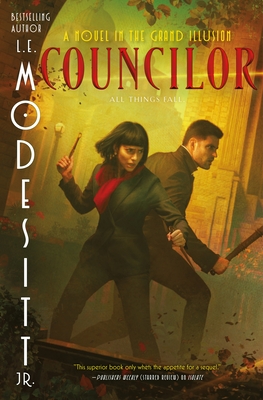 Councilor (The Grand Illusion #2) by
Councilor (The Grand Illusion #2) by 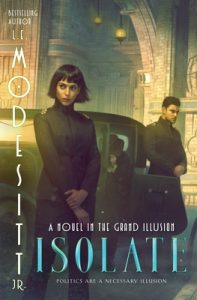 Escape Rating A: Just as with the first book in the series,
Escape Rating A: Just as with the first book in the series, 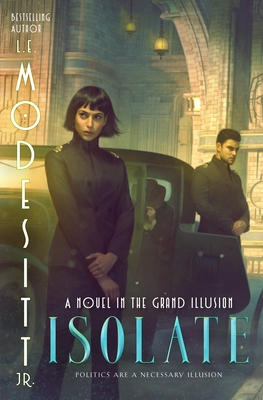 Isolate (The Grand Illusion #1) by
Isolate (The Grand Illusion #1) by  Instead, it ends up being the story of three people doing the best that they can to help their country in spite of everyone who tries to get in their way. In the process, they all rise above the place they expected to be, and that’s just the kind of story I love to sink into.
Instead, it ends up being the story of three people doing the best that they can to help their country in spite of everyone who tries to get in their way. In the process, they all rise above the place they expected to be, and that’s just the kind of story I love to sink into.